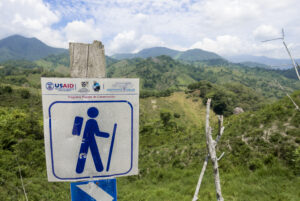This week Colombian Vice President Angelino Garzón is visiting Washington, D.C. to discuss human rights and labor issues, as well as to advocate for passage of the Colombia-U.S. Free Trade Agreement. The Washington Office on Latin America (WOLA), U.S. Office on Colombia (USOC), and Center for International Policy (CIP) welcome the new Colombian administration’s tone in discussing human rights issues and we look forward to concrete action by the Santos government. The Santos administration will need to show real improvements in labor and human rights before the U.S. Congress considers a trade agreement.
Colombia still faces major human rights challenges. The Colombian government must demonstrate more significant results in reducing violence against trade unionists, human rights defenders, Afro-Colombian and indigenous peoples and in prosecuting such cases, as well as cases of extrajudicial executions attributed to Colombian security forces. Colombia must also strengthen its protection for labor rights, including ending the exploitative labor cooperatives model. Finally, the Colombian government must make significant, sustained advances in dismantling paramilitary structures and protecting the human and territorial rights of Afro-Colombian and indigenous communities.
The Colombian and U.S. governments must consider the impact of the free trade agreement on Colombia’s 11 million rural inhabitants, two thirds of whom are poor and nearly a third of whom live in extreme poverty. Colombian small-scale farmers, who make up 10 percent of the country’s work force and 89 percent of its agricultural producers, would be the most adversely affected by the FTA provisions on agriculture. Case studies have shown that poverty and lack of economic alternatives have long been driving small farmers into illicit coca cultivation, particularly in regions of the country where the economic situation and presence of armed actors make living conditions most difficult. It would be a major U.S. policy failure if the FTA were to push more small farmers into drug production. U.S. policy makers must guarantee that their commercial policies do not contradict U.S.-Colombia anti-narcotics efforts.
The new Colombian government under Juan Manuel Santos has improved its tone on human rights. It has promoted a land and victims’ law that seeks to return a portion of illegally usurped lands to victims of violence. These efforts are welcome steps in the right direction. Yet structural and long-standing human rights concerns remain. Time and consistent effort geared towards results is needed before such problems are fully addressed.
The Colombian government still has much to do to end threats and attacks against trade unionists, human rights defenders, and community leaders, which have continued and even escalated since the new government took office in August 2010. The Colombian National Labor School (ENS) reports that 42 trade unionists were killed in 2010 as of December 15th 2010. The National Indigenous Organization of Colombia (ONIC) reported that over 105 indigenous persons were killed in 2010. Paramilitary and emerging illegal armed groups, which still act in many areas with the collusion or tolerance of the Colombian armed forces, continue to control areas of the countryside. The Colombian think-tank INDEPAZ’s recent report indicates that there are 6,000 armed men operating in 29 Colombian departments with between 7,400 and 12,000 persons supporting these structures. The implementation of even the best-intentioned land law will face major challenges due to the on-going internal armed conflict and dominance of illegal armed groups’ operations in areas designated for returns. A number of leaders of displaced communities who have reclaimed their land rights were killed in recent months.
The new administration has so far failed to demonstrate significant advances in prosecuting cases of extrajudicial executions attributed to Colombian security forces. Cases involving some 3,000 civilians killed are stalled in the civilian justice system. Many are failing to advance or are advancing slowly, while many other cases are still improperly handled by the military justice system instead of being transferred to civilian courts.
On the occasion of Vice President Angelino Garzón’s welcome visit to Washington, we encourage the Colombian government to commit to significant advances in addressing these serious human rights challenges. The U.S. Congress should await real progress on these issues before it considers the Colombia FTA.
Gimena Sánchez
Washington Office on Latin America
(202) 797-2171
Abigail Poe
Center for International Policy
(202) 232-3317
Diana Arango
U.S. Office on Colombia
(202) 232-8090

